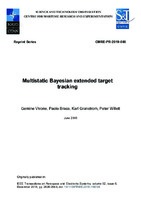| dc.contributor.author | Vivone, Gemine | |
| dc.contributor.author | Braca, Paolo | |
| dc.contributor.author | Granström, Karl | |
| dc.contributor.author | Willett, Peter K. | |
| dc.date.accessioned | 2019-06-19T12:46:50Z | |
| dc.date.available | 2019-06-19T12:46:50Z | |
| dc.date.issued | 2019/06 | |
| dc.identifier.govdoc | CMRE-PR-2019-086 | en_US |
| dc.identifier.uri | http://hdl.handle.net/20.500.12489/826 | |
| dc.description.abstract | To track an extended target presents challenges because the hypothesis of "one target means one detection" is not valid. Several approaches to extended target tracking (ETT) have been found promising, and in particular those involving random matrices have demonstrated their appeal. When targets are extended and the data is multistatic the issues are compounded; the random matrix model has continued appeal and offers a way to avoid enumerative data association. In this paper, a bistatic Bayesian ETT approach integrated into the random matrix framework is proposed. Furthermore, a closed-form solution for fusing multistatic radar system data into the same framework is presented. The proposed approaches are tested on both simulated data and real data. | en_US |
| dc.format | 18 p. : ill. ; digital, PDF file | en_US |
| dc.language.iso | en | en_US |
| dc.publisher | CMRE | en_US |
| dc.source | In: IEEE Transactions on Aerospace and Electronic Systems, volume 52, issue 6, December 2016, pp. 2626-2643, doi: 10.1109/TAES.2016.150724 | en_US |
| dc.subject | Target tracking | en_US |
| dc.subject | Bayesian statistical decision theory | en_US |
| dc.subject | Synthetic Aperture Radar (SAR) | en_US |
| dc.subject | Multistatic radar | en_US |
| dc.subject | Signal processing | en_US |
| dc.title | Multiple Bayesian extended target tracking | en_US |
| dc.type | Reprint (PR) | en_US |
| dc.type | Papers and Articles | en_US |
